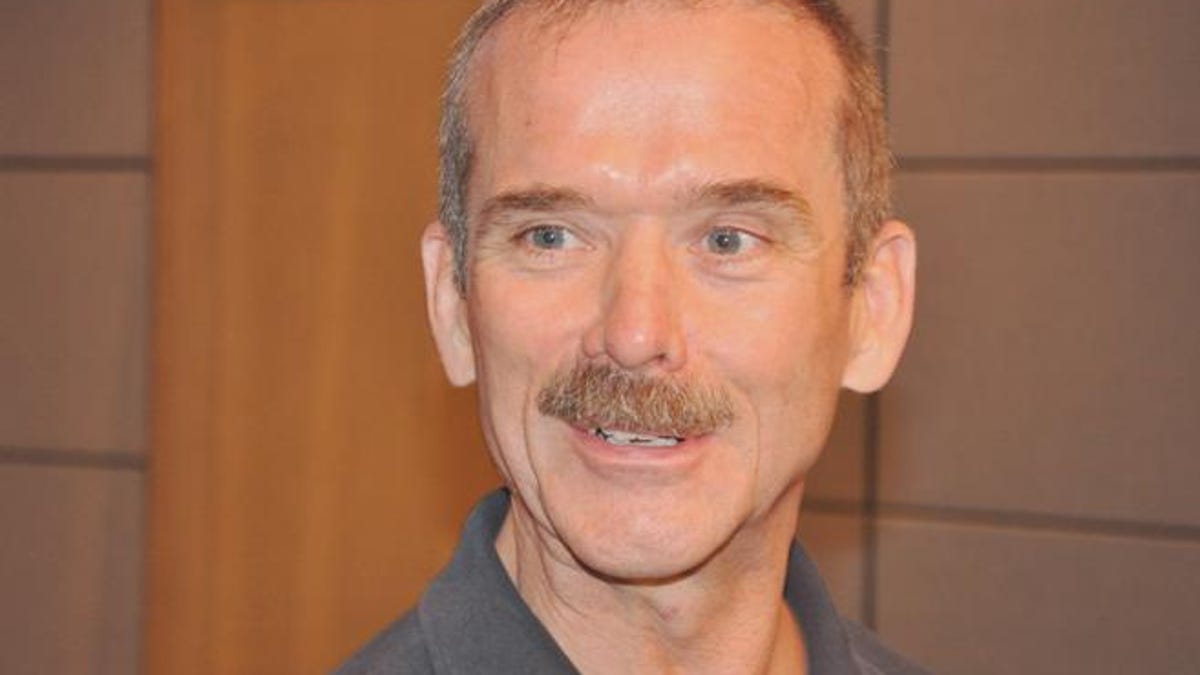Retiring astronaut Hadfield calls 'Space Odyssey' most realistic sci-fi
Preparing to jettison from the Canadian Space Agency, Chris Hadfield reflects on Kubrick's epic film and his youth on a corn farm watching "Star Trek" reruns.

MONTREAL -- Guitar-strumming astronaut Chris Hadfield is hanging up his spacesuit and quitting the astronaut biz, with plans to pursue "private interests." Does that mean a Leonard Nimoy-style album?
Heralded as the most popular spaceman since Neil Armstrong, the social-media phenom announced his retirement Monday at Canadian Space Agency headquarters outside Montreal, his first Canadian appearance since returning to Earth in May after five months on the ISS.
"I've decided to retire from government service after 35 years of serving our country," Hadfield, 53, told a press conference, adding that he's making good on a promise he made to his wife 30 years ago.
Beyond speaking engagements, Hadfield wouldn't elaborate on his plans, saying he's going to move back to Canada. He did, however, say he plans to continue taking photographs. Speaking before a model of the ISS, he said he took tens of thousands of photos from the station during Expedition 34/35 (see some of them in the gallery below) and many have not been published.
Hadfield reflected on an extraordinary military and space career including being the first Canadian to command the ISS, the first Canadian to perform a spacewalk when he installed the Canadarm2 onto the ISS, and the only Canadian to have boarded Mir, the Russian space station.
Hadfield blew minds with his poignant adieuto the International Space Station, a cover of David Bowie's "Space Oddity," itself a nod to "2001: A Space Odyssey" written by Stanley Kubrick and Arthur C. Clarke.
It should probably come as no surprise then, how he answered a CNET question on Monday: which sci-fi books and movies influenced him as a kid, and which were most realistic given his orbital experiences?
"Imagine that you are approaching this space station inside a small spaceship," he said, "and there are vehicles coming and going during your time there, and there are robot arms, and thrusters and movement, and the world soaring by underneath, and it's under construction."
"'2001: A Space Odyssey' was all about a space station under construction, and international consortia that are trying to figure out how to live there. They didn't get all the details right, but the idea is exactly the same.
"I was absolutely struck with the similarity between Clarke and Kubrick's vision of how that might look and the reality of where we are right now [for] this little Canadian kid in the same lifetime."
"Of course I watched 'Star Trek,'" he added. "I lived out on a farm. I think we got two channels, but on one of them we could watch reruns of Star Trek. It was a great western, but it was a western in a whole new environment. I was very much inspired by some of the issues they address, and the imagination of it."
He remembered meeting Clarke and escorting him around the Kennedy Space Center, as well as reading books by Robert Heinlein.
"The crossover between science fiction and science fact as we increase our capability beautifully continues to blur," Hadfield said, pointing out the ISS. "It's important for people to recognize that this place is a magnificent first outpost away from our planet. It's real, it has tremendous capability for science and research, but at the same time, it is human.
"It is a place of art, of self-realization, and seeing our own planet. That's why I took 45,000 pictures. Because I wanted people to internalize what capability this science fiction, and now science fact, has given to us as a species. And people around the world readily adopted that."

